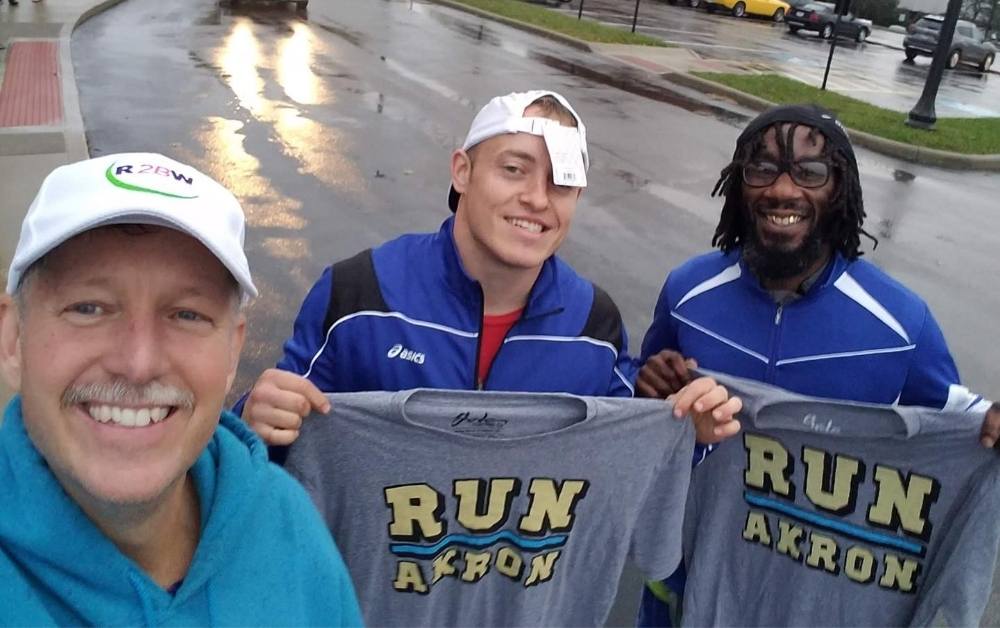We all know the positive impacts that exercise can have on us, but do you know how exercise can change the lives of those struggling with addiction? At relink.org, our desire is to connect people to all things recovery in their communities, whether it is treatment or ongoing support. I recently sat down with Keith Johnston, founder of Running2BWell to learn about his journey to recovery and starting an exercise movement that’s now helping hundreds every week to reconnect with themselves and others.
Keith grew up in college town in the South in the 60’s. He started using substances and pornography as a coping mechanism at an early age and continued into adulthood. He always went to church and faced deep shame and stigma around these struggles often seen as moral failings. It wasn’t until he really started approaching what he was going through as an addiction that he finally found recovery, and a huge piece of recovery for him is running. I asked Keith if he would be willing to share how Running2BWell got started and what he has learned through researching the use of exercise to treat addiction. The following is what Keith shared with me, in his own words.

I am in recovery and I use exercise as a way to cope with my cravings and mental health struggles. Like many, it has been a journey learning about my addiction, the driving forces, and healthy coping skills.
Research is clear that running/walking has specific benefits related to addiction and mental health. The most common mental health issue is depression/anxiety and many believe that these are driving forces in most addictions. A groundbreaking study at Duke University showed that regular aerobic exercise was just as effective in treating depression as Zoloft. The Duke SMILE study has been repeated a number of times and also cited in a review of studies in 2017 . Another study that connects exercise and recovery more directly is Exercise as a potential treatment for drug abuse: evidence from preclinical studies. Just this year a small study was done with people in treatment showing that exercise improved outcomes. Lastly, the book Spark by Dr. John Ratey discusses thoroughly the relationship between exercise, mental health, cognition, impulse control, etc.
Five years ago, a running friend of mine lost his son to heroin. At the calling hours, I casually mentioned that we should do something about this problem and the idea of a simple running group was born. We started meeting in Medina in early 2016, offering free fitness programs to people in recovery. From the very beginning we kept it simple and inclusive with the focus on the solution not the problem. We chose running/walking because it’s easy and doesn’t require special equipment.

Our running group, now called Running2Bwell, meets weekly in four locations in Northeast Ohio (Akron, Medina, Kent, Wadsworth) and routinely sees over 100 people every week. Each meeting lasts roughly 90 minutes and all paces/abilities are welcomed. People are encouraged to move at a pace that suits them whether it’s walking, running, or something in between. The important thing is that we are connecting socially and getting our heart rates up. Those who participate three times are given a free pair of running shoes; not just as a reward but to prevent injuries. Running2BWell also offers free local race entries and gym day passes during the winter months.
Families are encouraged to participate together. Early on, we recognized that addiction affects the entire family. At most of our meetings you will find children with their parents or grandparents and significant others participating. There is a special focus on helping kids learn how to use physical activity to cope with stress. Participating together in a shared healthy activity goes a long way in rebuilding relationships.

While we recognize that we are “all messed up” we do not focus on our problems, but rather the solutions. Staying physically and socially active are both amazing tools in recovery. Through this activity we learn together how to take control of our bodies, minds, and lives. A little bit of time is spent at each meeting talking about how exercise benefits us and why it’s important for wellness. Exercise, in our case running, is something that we do TO BE WELL. It is in fact both a treatment and inoculation for substance use disorder. We firmly believe that each of us has the ability and the responsibility to change the way we deal with stress and trauma; the way we think and live.
Now I want to tell you about Rosie, Tony, and Milissa, three fighters. Rosie was part of our small church and we quickly connected. His brutal honesty and generous heart were hard to figure out at first, but I soon found his soft nuggety insides. He loved working with his hands and helping others. He was the house-dad at a halfway house for guys coming out of prison and he frequently took these men under his wing to teach them the value of hard work. He was in long-term recovery and devoted his life to helping others with struggles but caught COVID from one of the guys and passed away in late April. I met Tony about two years ago when he was in residential treatment at Community Assessment and Treatment Services (CATS) in Wadsworth, Ohio. I immediately loved his spirit. After treatment, he started coming to our Medina group along with his girlfriend and children. Things were going well, he was working hard, attending meetings, exercising, etc. but then the old cycles repeated. He went through treatment again, came out, and once again could not break free. He died June 24.

Many beautiful souls do not win their fight for recovery, but where there’s life, there’s hope. Milissa has been coming to the Kent group for about four months now. She came in with a lot of enthusiasm, but also with ample struggles mentally and physically. As we’ve gotten to know each other I’ve learned that she is an amazing fighter. She doesn’t approach any challenge halfway; it’s all or nothing. She still has a long way to go in her recovery but physically she has lost enough weight for her doctors to reduce her medications and they are impressed with her recent fitness turnaround. Just today, she speed walked a 5K in 44 minutes, the fastest she’s ever completed that distance. We are cheering her on, she is still in the fight.
Running2BWell meets face-to-face with roughly 100 Keith’s, Milissa’s, and Tony’s every week where we teach them to fight for their health, recovery, and lives. We encourage, coax, and sometimes bribe, folks to take back control of their lives; one step at a time. Everyone, especially those of us in recovery, has lost control of some aspect of our lives. Exercise is a great way to teach us that we do in fact have some control.

If any of this resonates with you or someone you know, here are a few practical and simple things to start with:
- Take that first step! Often the first step is the very hardest. I recently had a great conversation with a friend. He was struggling with the motivation to get started and was only doing the very bare minimum, strolling. I challenged him to try a few push-ups at the end of one of our meetings. He had all sorts of reasons to put it off, he was tired, he wanted to lose weight before starting, he didn’t want to start because he knew he would not keep it up. He would’ve kept talking and presenting more arguments but I simply got down and started doing some push-ups myself, challenging him to just start. He finally did 10 push-ups!! Right away, he said he felt better physically and emotionally. He gained confidence because he was able to overcome his excuses. JUST start; today, not tomorrow.
- Start slowly! When you haven’t been physically active for a long time your body has atrophied, become weaker. Your muscles, bones, heart, lungs aren’t as strong as they used to be. The number one reason why people give up starting a fitness program is because they jump in too quickly and get hurt. At Running2bWell we do our best to keep people from pushing themselves too hard too quickly. Having high quality running shoes will help prevent injury.
- Join others! My friend needed my encouragement, my challenge, but mostly my example. I didn’t order him or force him, I modeled the desired behavior and encouraged him to join. Surround yourself with people heading in the right direction. Find your sober tribe.
- Commit! Once you get rolling, it’s easy to keep going in that direction so make sure that your initial steps are in the right direction. Pretty soon you will have developed a healthier lifestyle; celebrating both fitness and recovery milestones.
- Start small but start! Talking about it, reading about it, is useless in the end unless you start moving. Once you start, your momentum will carry you forward and make the next steps easier.

In the end, Running2BWell is helping people learn how to fight for their physical and mental health and therefore their recovery and their very lives. It takes effort, discomfort, inconvenience, help from others, and commitment but it’s worth it because You are worth it. No one else can exercise or recover for you. You have to take the steps!
We would love to have you join us at one of Running2BWell’s weekly meetings. You can find all of our information on our website and Facebook pages.

About Bethany
Bethany Friedrichsen is the Statewide Coordinator for relink.org. She has a background in psychology and has been working for the past three years in the addiction recovery and reentry space to create connections for people in need to the caring resources in their community.


Recent Comments